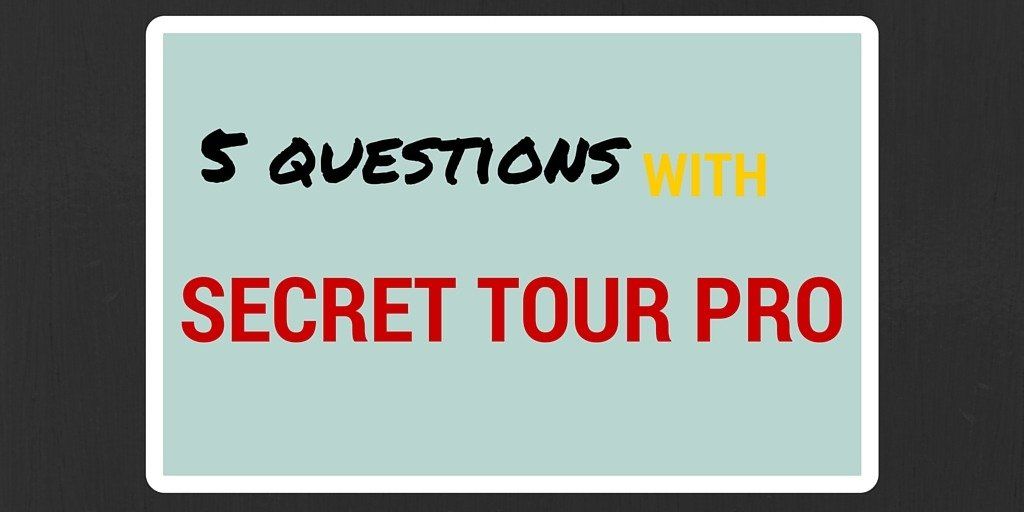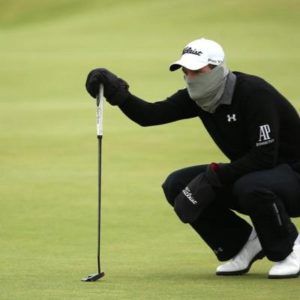
A few months ago an account popped up on Twitter called Secret Tour Pro (@secrettourpro). He won't reveal who he is, but he plays on both the European and PGA Tours. Many people are convinced it's Lee Westwood or Geoff Ogilvy, but his identity still remains a mystery.

His account has swelled to 18 thousand followers pretty quickly. Give him a follow, it's extremely entertaining. He fields questions from everyone, and gives real insight on what's actually going on in professional golf, which is a real treat since most pros are tight-lipped in their dealings with the media.
I reached out to the mystery man, and he agreed to do an interview via email. I wanted to get some insight on how he thought golfers could improve their games. Enjoy!
What is the #1 mistake that amateur golfers make, and what could they do to fix it?
The biggest mistakes I see amateurs make when I play with them is knowing their true ability. An example would be guys trying to play the miracle flop shot over the bunker to pin tucked tight against said bunker. Nine times out of then they go under it, leave it in the bunker, then try the same shot again leaving it in the bunker, eventually getting out, and 2 putting for an 8!
Three shots could have been easily saved. Play the percentages, get it on the green, and leave yourself 30ft and 2-putt.
The other issue where I see guys losing many shots is with their chipping. They'll have a 30ft shot, and take out their 60*, advance it 10 feet and wonder what went wrong!? It went wrong when they pulled the wrong club out. I always try and teach younger guys that you never chip with anything more than a 47*/PW. Guys are so surprised when they see they have more control and it's actually easier for them!
Lastly, amateurs have such poor golf IQs. I don't mean the quiz question type of IQ, I mean a poor understanding of what's the right move to pull.
I've always thought that Terry Mundy (Ian Poulter’s caddy) had one of the best golf IQs in the game. At a tournament last year Poulter was stuck behind a cactus, and wanted to hit a long iron, try and hook it around, and run it up the front. What followed between the two was a huge row, Terry could see that shot wasn't on, and wanted him to chip out to the fairway. Poults was adamant that his 3rd would be too far back. Eventually, Terry handed him a wedge and walked off. Poulter chipped out to fairway, stiffed his 3rd and walked off with a par! Amateurs need to have more of this, and really need to weigh up the risks before they play any shot, especially ones like this. That could run up an 8, 9 or even a 10 on your scorecard!
Tell us a little bit about how you practice. The rest of us don’t have as much time as a pro. How can we practice more effectively, and where is our time best spent?
I'm not a huge fan of the range, and I've always made this clear on my Twitter account. To me you can't learn anything on the range. You've got to get out and play, but there are guys on tour that will learn from hitting balls for 6 hours rather than playing 18 holes. So there is not right way of doing it, it's all personal preference.
I like to get on the course, play golf, and chip/putt balls on the green, and watch them move. It gives your eyes more vision. I'm lucky to be a member at a club that is quiet. I could stay on one hole for 2 hours hitting approach shots, watching the bounce, spin, settle etc. It gives me more confidence in my game.
I’ve seen you debate over whether or not equipment upgrades are worth it. Pros have access to the best of everything, and fitting technology. What are your thoughts on the major manufacturers’ marketing claims, and how can golfers spend their money more effectively for actual performance on the course?
Well according to some, if you've bought the latest driver for the last 10 years guys should be hitting it 600 yards by now! What has improved with clubs over the years is forgiveness. Off-center hits certainly go further than previous models. Where I think amateurs can benefit is by not buying the latest equipment, but ones from 2 years ago. The technology hasn't advanced that far in 2 years.
Where I do find it important for amateurs is getting fitted correctly. Just the other day I played with a guy who was a 3 handicap. He had a huge issue with his irons. They were hooking miles, but he was using an regular-flex shaft. I've seen it the other way too. Guys playing off a 25 handicap with extra-stiff shafts. It's certainly important to play the right equipment.
You probably know a thing or two about the mental side of golf, and performing under pressure. What would you say to a player who has a hard time bringing their driving range swings out on the course?
Play more on the course than on the range, it's pretty simple! A golf course has a much different look than a driving range.
I always stress that improving your game 100 yards and in is the quickest way to lower your score for most golfers rather than trying to improve your swing, and add distance. Most players ignore this part of the game in favor of practicing with their longer clubs. Do you agree?
Well it's important to remember that you have to have that long game to get to 100 yards and in first! And really, the majority of 2nd shots (from the fairway) are actually around 150yds. For amateurs I believe they throw out 10 shots minimum a round from 50 yards and in. This includes pitching, chipping, bunker play, and putting. From 50 yards and in on most holes, it's your 3rd shot and you're trying to get up and down for par.
We care about the protection of your data Read our Privacy Policy